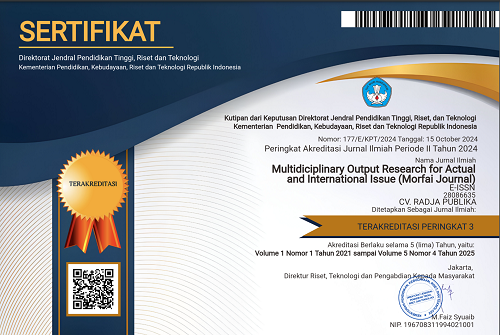THE APPLICATION OF ROBOTIC PROCESS AUTOMATION IN THE FIELD OF ACCOUNTING: A LITERATURE STUDY
Main Article Content
Muhammad Nur
Dhieka Avrilia Lantana
Erwin Indriyanto
Kumba Digdowiseiso
Hafiza Aishah Hashim
Accounting seeks to facilitate the process of financial managers gathering financial records, categorizing financial elements, identifying patterns in financial transactions, and conveying financial circumstances. Originally, accounting was performed manually by individuals, but with advancements in technology, robotic process automation (RPA) emerged as a method for carrying out accounting tasks. This implementation has a beneficial effect on the company, resulting in enhanced performance and efficiency. Nevertheless, it has the capacity to generate employment issues. Hence, a comprehensive investigation is required to explore the utilization of robotic process automation in the domain of accounting. The approach employed is a rigorous systematic literature review utilizing scientific publications. The scientific literature utilized must adhere to the specified criteria. The data analysis employs a descriptive and argumentative methodology. The findings indicate that the presence of RPA does not have a substantial capacity to substitute for human involvement. In reality, RPA merely eliminates human tasks, thereby allowing humans to allocate their time towards enhancing more accurate decision-making processes. Occupations within the accounting sector that can benefit from the implementation of RPA encompass bookkeeper, financial accountant, controller (management accountant), business data analyst, treasurer and risk manager, and financial systems and process manager.
Akadiati, VAP, Sinaga, I., & Sumiyati, L. (2022). The Impact of Implementing an Accounting Information System on the Quality of MSME Financial Data During the Pandemic in Bandar Lampung. E-Journal of Accounting, 32(10), 3069. https://doi.org/10.24843/EJA.2022.v32.i10.p12
Ascani, I., Ciccola, R., & Chiucchi, M. S. (2021). A Structured Literature Review about the Role of Management Accountants in Sustainability Accounting and Reporting. Sustainability, 13(4), 2357. https://doi.org/10.3390/su13042357
Bakarich, K. M., & O'Brien, P. E. (2021). The Robots are Coming … But Aren't Here Yet: The Use of Artificial Intelligence Technologies in the Public Accounting Profession. Journal of Emerging Technologies in Accounting, 18(1), 27–43. https://doi.org/10.2308/JETA-19-11-20-47
Fernandez, D & Aman, A. (2018). Impacts of Robotic Process Automation on Global Accounting Services. Asian Journal of Accounting and Governance, 131, 123–131. https://doi.org/http://dx.doi.org/10.17576/AJAG-2018-09-11
Hasanah, S & Siregar, T, R. (2021). The Influence of Implementing Government Accounting Standards, Accounting Information Systems, Internal Control Systems, and Human Resource Competence on the Quality of OPD Financial Reports in Labuhanbatu Regency. Indonesian Journal of Accounting, Finance & Taxation (JAKPI), 9(1). https://jurnal.unimed.ac.id/2012/index.php/eua/article/view/25706
Hifni, S., Sayudi, A., & Hayat, A. (2020). The Role of Sustainability Accounting: Accountability in Ecology, Socio and Economics. Proceedings of the National Seminar on Wetland Environments, 4(2), 404–414.
Kaya, C.T., & Turkyilmaz, M. (2019). Impact of RPA Technologies on Accounting Systems . January 2021. https://doi.org/10.25095/mufad.536083
Kokina, J., & Blanchette, S. (2019). Early evidence of digital labor in accounting: Innovation with Robotic Process Automation. International Journal of Accounting Information Systems, 35, 100431. https://doi.org/10.1016/j.accinf.2019.100431
Leitner-Hanetseder, S., Lehner, O.M., Eisl, C., & Forstenlechner, C. (2021). A profession in transition: actors, tasks and roles in AI-based accounting. Journal of Applied Accounting Research, 22(3), 539–556. https://doi.org/10.1108/JAAR-10-2020-0201
Page, MJ, McKenzie, JE, Bossuyt, PM, Boutron, I., Hoffmann, TC, Mulrow, CD, Shamseer, L., Tetzlaff, JM, Akl, EA, Brennan, SE, Chou, R., Glanville, J ., Grimshaw, J.M., Hróbjartsson, A., Lalu, M.M., Li, T., Loder, E.W., Mayo-Wilson, E., McDonald, S., … Moher, D. (2021). The PRISMA 2020 statement: an updated guideline for reporting systematic reviews. BMJ, n71. https://doi.org/10.1136/bmj.n71
Ribeiro, J., Lima, R., Eckhardt, T., & Paiva, S. (2021). Robotic Process Automation and Artificial Intelligence in Industry 4.0 – A Literature review. Procedia Computer Science, 181, 51–58. https://doi.org/10.1016/j.procs.2021.01.104
Siderska, J. (2020). Robotic Process Automation — a driver of digital transformation? Engineering Management in Production and Services, 12(2), 21–31. https://doi.org/10.2478/emj-2020-0009
Sururi, R, M. et al. (2022). Design of a Sales Accounting Information System with an Emphasis on Security Systems at PT Thanks to Young People. Journal of Accounting, Taxation and Auditing, 3(1). http://pub.unj.ac.id/index.php/japa/article/view/713
Yusuf, M, F, M. et al. (2023). Integration of Artificial Intelligence Technology in Modern Accounting Systems. Journal of Trends Economics and Accounting Research, 4(1). https://journal.fkpt.org/index.php/jtear/article/view/902
Zhang, Y. (2020). The Impact of Artificial Intelligence and Blockchain on the Accounting Profession. 8, 110461–110477. https://doi.org/10.1109/ACCESS.2020.3000505









